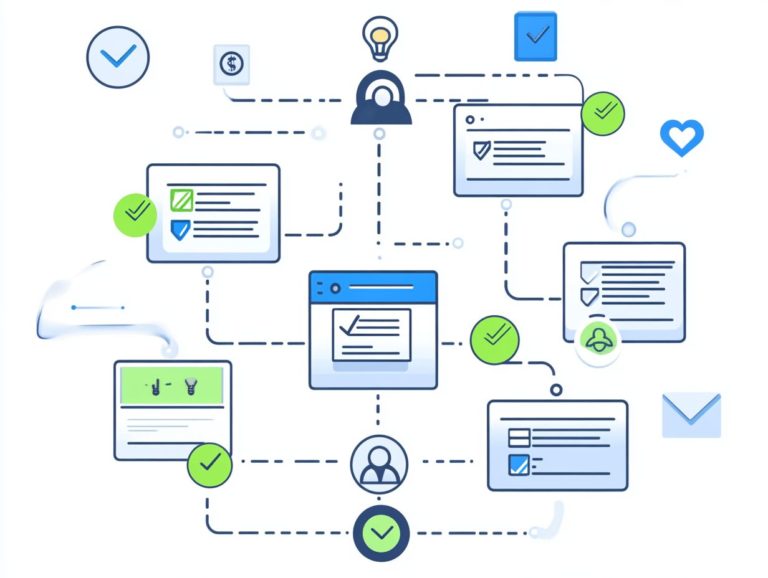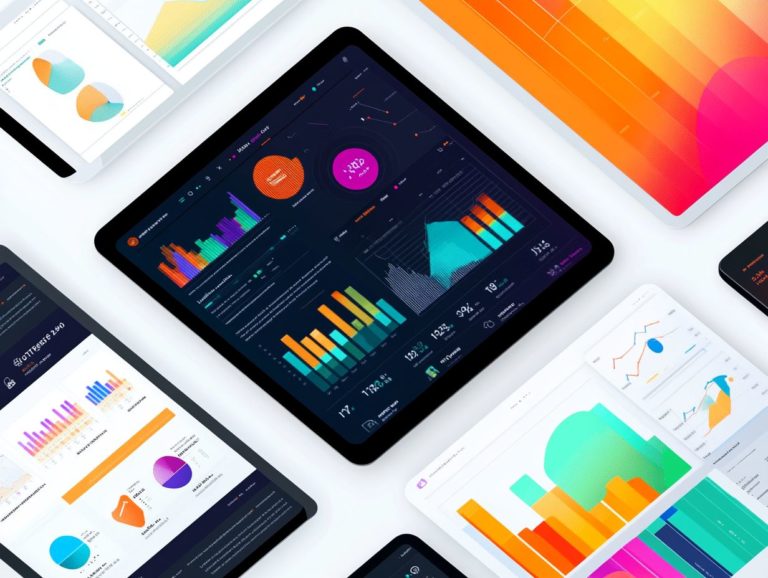Salesforce vs Microsoft Dynamics: A Detailed Review
Choosing the right Customer Relationship Management (CRM), a system that helps businesses manage interactions with customers, can truly transform your business. It enhances customer engagement and streamlines your operations.
Let s explore two industry leaders: Salesforce and Microsoft Dynamics! This article meticulously examines their key differences in features, functionality, target markets, and pricing.
The benefits of each platform are clearly outlined, providing a side-by-side comparison to help you determine which CRM aligns best with your business needs.
Don t wait discover your ideal CRM solution today!
Contents
- Key Takeaways:
- Key Differences between Salesforce and Microsoft Dynamics
- Benefits of Salesforce
- Benefits of Microsoft Dynamics
- Comparison of Salesforce and Microsoft Dynamics
- Which CRM System is Right for You?
- Frequently Asked Questions
- What is the main difference between Salesforce and Microsoft Dynamics?
- Which is more expensive, Salesforce or Microsoft Dynamics?
- Can Salesforce and Microsoft Dynamics integrate with other software?
- Which software offers better customer support, Salesforce or Microsoft Dynamics?
- Which software is better for small businesses, Salesforce or Microsoft Dynamics?
- Is there a free trial available for Salesforce and Microsoft Dynamics?
Key Takeaways:
Salesforce and Microsoft Dynamics are two popular CRM systems with notable differences in features, target market, and pricing. Salesforce offers a robust and customizable platform, while Microsoft Dynamics is known for its seamless integration with Microsoft Office and other Microsoft products. When choosing between Salesforce and Microsoft Dynamics, businesses should consider factors such as their specific needs, budget, and existing technology infrastructure.
Overview of the Two CRM Systems
In the realm of customer relationship management (CRM) systems, two heavyweights command attention: Microsoft Dynamics 365 and Salesforce. Each platform boasts unique advantages and features tailored to meet diverse business needs, whether you’re looking to enhance customer engagement or streamline sales processes.
Microsoft Dynamics 365 integrates seamlessly with Microsoft Office and offers robust reporting and analytics capabilities. Salesforce is celebrated for its powerful marketing automation tools and intuitive user experience.
Both CRMs provide comprehensive capabilities that empower you to manage customer data effectively. For example, Microsoft Dynamics 365 utilizes Microsoft Power BI for advanced analytics, allowing you to extract actionable insights from your data. Meanwhile, Salesforce works seamlessly with Pardot, enhancing your lead generation and nurturing processes while enabling more personalized customer outreach.
Together, these systems play crucial roles in digital transformation, empowering you to adapt to evolving market dynamics, improve communication channels, and ultimately cultivate stronger relationships with your customers through data-driven decision-making.
Key Differences between Salesforce and Microsoft Dynamics
When comparing Salesforce and Microsoft Dynamics 365, it’s crucial to identify the key differences that distinguish these CRM systems.
Salesforce stands out with its user-friendly interface and a vast array of third-party integrations available through its AppExchange marketplace. This makes it a prime choice for businesses prioritizing marketing automation and customer engagement.
In contrast, Microsoft Dynamics 365 boasts robust analytics capabilities, seamless integration with Microsoft Office and Teams, and flexible deployment options whether you prefer on-premises hosting or cloud solutions.
Recognizing these distinctions empowers you to make informed decisions about your CRM software, tailored to your organization s unique needs.
In conclusion, both Salesforce and Microsoft Dynamics offer distinct advantages. Evaluate your business needs carefully to choose the right CRM solution that will drive your success.
Features and Functionality
Both Salesforce and Microsoft Dynamics 365 present a wide range of features that can significantly enhance your lead management, case management, and overall sales automation efforts. Salesforce offers strong marketing tools to effectively manage campaigns, while Microsoft Dynamics 365 empowers your sales team with performance management and customer data analytics.
Both platforms focus on improving customer satisfaction through streamlined case management processes and enhanced customer self-service options.
These solutions excel in user experience, ensuring user-friendly interfaces that make navigation a breeze and facilitate seamless integration into your existing systems.
By incorporating advanced social CRM features, Salesforce allows you to leverage social media interactions, thereby enhancing customer engagement and support.
On the flip side, Microsoft Dynamics 365 shines with powerful AI-driven analytics; it predicts customer behavior and streamlines communication across multiple channels.
Both CRMs prioritize delivering tailored customer experiences, making them critical for any business looking to harness the full potential of integrated sales and marketing strategies.
Target Market and Pricing
Understanding the target market and pricing strategies of Salesforce and Microsoft Dynamics 365 is crucial as you choose the right CRM solution for your business.
When evaluating these CRM systems, take a close look at their tiered pricing structures and subscription options. Salesforce offers various tiers designed specifically for small to medium-sized enterprises, allowing you to customize the service according to your operational needs. Be aware of potential hidden costs that may arise, such as add-ons for enhanced customer data analytics or advanced reporting features.
Conversely, Microsoft Dynamics 365 presents a more inclusive model that integrates smoothly with your existing enterprise systems, leading to significant cost savings over time. While the initial subscription may seem higher, the comprehensive capabilities often make it a worthy investment for larger organizations aiming to streamline customer engagement and optimize business operations.
Benefits of Salesforce

Salesforce presents a wealth of benefits that remarkably elevate customer engagement and propel business growth, positioning it as a premier choice in the CRM landscape!
Its robust sales automation features streamline your sales processes, enabling your team to concentrate on nurturing customer relationships rather than just managing tasks.
Salesforce integrates seamlessly with powerful marketing clouds, and its advanced reporting capabilities offer you strategic insights to refine marketing efforts and enhance overall customer satisfaction.
Advantages for Businesses
The advantages of Salesforce for your business are numerous, particularly in boosting your sales team’s productivity and optimizing marketing automation strategies.
By harnessing its comprehensive CRM capabilities, you can effectively manage customer data and refine your lead management processes, ultimately driving better sales outcomes.
Salesforce’s robust reporting and analytics functionalities provide you with the insights needed to make informed decisions and refine your growth strategies.
Many companies have reported significant improvements in customer engagement levels, enabling them to build stronger relationships with their clients.
Utilizing Salesforce allows you to personalize your communications, ensuring you meet individual client needs and preferences. Your sales team will benefit from accurate sales forecasting tools, allowing them to anticipate market trends and align their efforts strategically.
This proactive approach not only enhances the user experience but also strengthens performance management, paving the way for sustainable business growth.
In essence, integrating Salesforce transforms how you operate, yielding tangible results that contribute to your long-term success!
Explore Salesforce today and elevate your customer engagement!
Benefits of Microsoft Dynamics
Microsoft Dynamics 365 offers a treasure trove of benefits tailored to meet your organization s diverse needs, especially in integration, customization, and performance management.
Its ability to seamlessly connect with other Microsoft products, such as Office and Teams, boosts productivity and fosters collaboration among your sales teams.
The platform is flexible and has strong tools to keep your data accurate. This gives your teams the power to customize your CRM solutions according to your specific operational requirements, ultimately enhancing customer satisfaction and engagement.
Advantages for Businesses
The advantages of Microsoft Dynamics 365 for your business are impressive, thanks to its robust integration capabilities and tools to manage resources and processes. It streamlines your customer relationships and enhances sales automation like a well-oiled machine.
You ll find that its powerful analytics tools provide actionable insights. These insights guide your strategic decisions and drive growth while improving customer satisfaction.
With extensive customization options, the CRM adapts seamlessly to the unique needs of your industry. In various sectors, keeping data accurate and up-to-date gives your teams the power to maintain compliance and accuracy in reporting, which is essential for building trust with stakeholders.
Your sales teams can leverage Dynamics 365 to track leads effectively, manage pipelines, and optimize communication with clients. This fosters long-term relationships that matter.
Your customer service teams can use its features to resolve issues swiftly, enhancing the overall customer experience and loyalty. The platform significantly boosts operational efficiency by aligning various departments around shared goals, leading to greater productivity and a comprehensive understanding of market trends.
Comparison of Salesforce and Microsoft Dynamics
A detailed comparison of Salesforce vs SugarCRM and Microsoft Dynamics 365 uncovers distinct strengths and weaknesses, guiding you in selecting the CRM software that best fits your business needs.
Salesforce stands out for its exceptional user experience and seamless third-party integrations, making it particularly well-suited for marketing automation. On the other hand, Microsoft Dynamics 365 shines in performance management and offers tools that help you understand your data better.
By grasping these key differences, you can confidently choose a CRM solution that aligns perfectly with your operational objectives.
Side by Side Analysis

In a side-by-side analysis, you’ll find that Salesforce and Microsoft Dynamics 365 present their unique approaches to customer engagement and sales team efficiency, making it essential to know what to look for in a CRM.
Salesforce shines with its intuitive user interface and robust marketing tools, making effective case management and engagement strategies a breeze. Meanwhile, Microsoft Dynamics 365 provides a more holistic view of customer interactions by leveraging its seamless integration with Microsoft applications to boost team collaboration and deliver strategic insights.
Both platforms address the ever-evolving demands of digital transformation by adopting strong lead management processes. Salesforce stands out with its customizable dashboards and analytics capabilities, giving your sales teams the power to track performance metrics and make informed, data-driven decisions.
Microsoft Dynamics 365 also offers advanced reporting features that dive deep into customer behavior. This helps your marketing teams design targeted campaigns with precision.
Ultimately, the choice between these two powerful software solutions hinges on how well each aligns with your organization’s specific operational needs and strategic goals. Your selection process is crucial for enhancing overall productivity.
Which CRM System is Right for You?
Selecting the ideal CRM system, whether it s Salesforce or Microsoft Dynamics 365, hinges on multiple factors tailored to your unique business needs and objectives.
It’s essential to evaluate your specific requirements think budget constraints, the necessity of third-party integrations, and the level of customization that will truly elevate your customer relationships.
Grasping these elements can profoundly influence your decision-making process. This ensures that the CRM system you choose not only bolsters your organization s growth but also enhances operational efficiency.
Key Factors to Choose the Right CRM for Your Business
When evaluating Customer Relationship Management (CRM) systems, consider several critical factors that align with your unique operational needs. Think about customization options, pricing structures, and integration capabilities.
Effective data governance is paramount; you want to handle customer data securely while facilitating seamless interactions across various platforms. Consider these factors when selecting the most effective CRM solution to improve customer satisfaction and drive business growth.
Beyond these foundational aspects, the specific demands of your industry can further influence your CRM selection. For example, if you’re in retail, you might prioritize sales automation features that enhance inventory management and customer engagement. In contrast, if you’re in healthcare, strict compliance with data protection regulations and user-friendly interfaces for personnel with varying levels of tech expertise might be top of mind.
Make user experience a top priority! Intuitive navigation and responsive design not only make the system more accessible but also promote user adoption. This is critical for maximizing productivity and minimizing disruption during implementation.
By carefully weighing these factors, you can ensure that your CRM choice supports your long-term goals and enhances operational efficiency.
Frequently Asked Questions
What is the main difference between Salesforce and Microsoft Dynamics?
The main difference between Salesforce and Microsoft Dynamics is that Salesforce is a cloud-based CRM software, while Microsoft Dynamics offers options for both cloud and on-premises solutions. Additionally, Salesforce is recognized for its user-friendly interface and customizable features, whereas Microsoft Dynamics is notable for its strong integration with other Microsoft products and powerful reporting capabilities.
Which is more expensive, Salesforce or Microsoft Dynamics?

In terms of pricing, Salesforce is generally considered more expensive than Microsoft Dynamics. Salesforce uses a subscription-based pricing model, which can accumulate over time, especially for companies with a large number of users. Microsoft Dynamics, on the other hand, offers a more flexible pricing structure, allowing businesses to choose the features and services they need and pay only for those.
Can Salesforce and Microsoft Dynamics integrate with other software?
Yes, both Salesforce and Microsoft Dynamics offer robust integration capabilities with other software and applications. Salesforce has a large marketplace for third-party applications and integrations, while Microsoft Dynamics provides seamless integration with other Microsoft products like Outlook and SharePoint.
Which software offers better customer support, Salesforce or Microsoft Dynamics?
Both Salesforce and Microsoft Dynamics provide solid customer support. Salesforce offers 24-hour support via phone, email, and chat, along with an extensive online knowledge base. Microsoft Dynamics also provides phone and email support, as well as access to a community forum and online resources.
Which software is better for small businesses, Salesforce or Microsoft Dynamics?
For small businesses, Salesforce may be a better option due to its user-friendly interface and customizable features. However, Microsoft Dynamics is also a viable option, especially for companies already using other Microsoft products, as it offers seamless integration and a familiar interface. Ultimately, the best choice will depend on the specific needs and budget of the business.
Is there a free trial available for Salesforce and Microsoft Dynamics?
Yes, both Salesforce and Microsoft Dynamics offer free trials for potential users to test their software and see if it meets their needs. Salesforce provides a 30-day free trial, while Microsoft Dynamics offers a 30-day trial for its cloud version and a 7-day trial for its on-premises version.
Explore the free trials today to find the CRM system that best fits your business needs!







